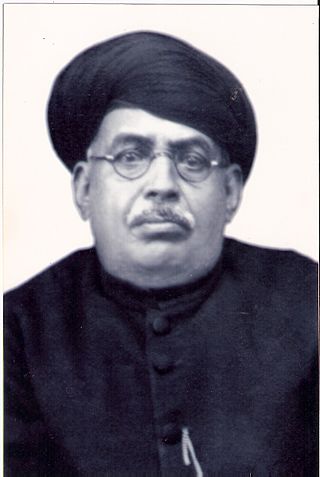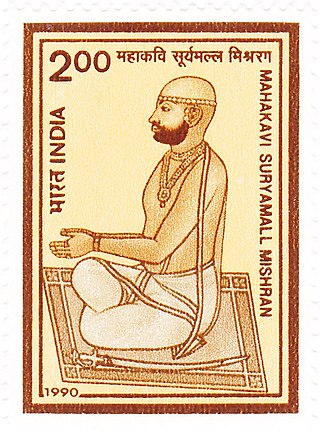Related Research Articles

Gaurishankar Hirachand Ojha, born in Rohida village of Sirohi District, was a historian from the Indian state of Rajasthan. A prolific author, he wrote several books on the history of Rajasthan and other historical subjects. Subsequent historians from Rajasthan have referred to him as Guruvara Mahamahopadhyaya. Ojha regarded Kaviraj Shyamaldas as his guru and worked under him as assistant secretary of the historical department, Udaipur
Abdul Vaheed is a well-known author in the Rajasthani language.

Dingal, also known as Old Western Rajasthani, is an ancient Indian language written in Nagri script and having literature in prose as well as poetry. It is a language of very high tone and requires a specific style of speaking. Dingal was used in Rajasthan and adjoining areas including Gujarat, Kutch, Malwa, and Sindh. Most of Dingal literature is said to be composed by Charans. It was prominently used in composition of war poetry praising the martial exploits of Rajput and Charan war heroes.
Indian English poetry is the oldest form of Indian English literature. Henry Louis Vivian Derozio is considered the first poet in the lineage of Indian English poetry followed by Rabindranath Tagore, Sri Aurobindo, Sarojini Naidu, Michael Madhusudan Dutt, and Toru Dutt, among others.
Rajasthani literature is an tradition in Indian literature dating to the 2nd millennium, which includes literature written in the Rajasthani language. An early form of Rajasthani started developing in the 11th century from Saurseni Prakrit as Maru-Gurjar or Gurjar Apabhramsa. Early Rajasthani literature was usually written by Charans. Earlier Rajasthani was known as Charani or Dingal, which was close to Gujarati. Medieval Rajasthani literature was mostly heroic poetry mentioning the great kings and fighters of Rajasthan. Rabindra Nath Tagore, a Bengali polymath, once said, "The heroic sentiment which is the essence of every song and couplet of a Rajasthani is peculiar emotion of its own of which, however, the whole country may be proud". It is generally agreed that modern Rajasthani literature began with the works of Suryamal Misran, including the Vansa Bhaskara and the Vir Satsai. The Vansa Bhaskara contains accounts of the Rajput princes who ruled in what was then Rajputana, during the lifetime of the poet (1872–1952). The Vir Satsai is a collection of hundreds of couplets.

Gajanan Madhav Muktibodh was one of the most prominent Hindi poets, essayists, literary and political critics, and fiction writers of the 20th century.
Sitaram Lalas was a linguist and lexicographer of India.

Kaviraja Suryamall Misran was the Rajkavi (poet-historian) of Bundi kingdom. He was proficient in six languages including Dingal, Sanskrit, Prakrit, Apabhraṃśa, and was a scholar of grammar, logic, history and politics. His important works include Vansh Bhaskar, Vir Satsai, Balwant Vilas and Chhandomayukh.

Devarshi Kala Nath Shastry was born on 15 July 1936. He is a Sanskrit scholar and was honoured by the President of India in 1988. He is an Indologist and a prolific writer in Sanskrit, Hindi and English, and a well-known linguist, who has contributed to the campaign of evolving technical terminology in Indian languages and ensuring a respectable status for Hindi, the official language of his state and the Indian union.

Ram Vilas Sharma was a progressive literary critic, linguist, poet and thinker. He was born in Unchgaon Sani, Unnao District, Uttar Pradesh. In a career spanning nearly five decades, Sharma authored over 50 books. He was the recipient of many awards including the Sahitya Academy award, Bharat Bharati, Shalaka Samman, Vyas Samman, and the Shatabdi Samman just last week.
Rajasthani people or Rajasthanis are a group of Indo-Aryan peoples native to Rajasthan, a state in Northern India. Their language, Rajasthani, is a part of the western group of Indo-Aryan languages.
Chandra Prakash Deval is a Rajasthani poet and translator. He is also the convener of Rajasthani Advisory Council of Sahitya Akademi.
Saubhagya Singh Shekhawat was an Indian Rajasthani language writer.
Girija Shankar Sharma is a historian and scholar of Rajasthani as well as Hindi language literature. He received a Master of Arts (M.A.) in History from Dungar College and a Doctor of Philosophy (Ph.D.) from the University of Rajasthan, Jaipur. He joined the Rajasthan State Archives (Bikaner) in 1963 and retired as deputy director of the Archives in 1996.
Divakar Sharma was an Indian scholar of Sanskrit, Hindi and Rajasthani languages.

Bharatiya Bhasha Parishad, a Kolkata-based literary organization was founded on 1975 by Sitaram Seksaria and Bhagirat H Kanodia with the aim of promoting Indian languages. It works for the development of Indian literature through publication of books on literature and implementation of various literary projects. It honors Indian writers for the contribution to Indian literature through their respective languages. The award consists of cash prize 1 lakh, a memento and a shawl.
Bhanwar Singh Samaur is an Indian writer, poet, historian, and social worker from Rajasthan. Samaur is the recipient of the Sahitya Akademi Award 2020 for his work Sanskriti ri Sanatana Deeth. His career has spanned more than 50 years including works on history, literature, and poetry in Rajasthani as well as Hindi. Dr. Samaur is a retired Hindi Lecturer from Lohia Postgraduate College, Churu.
Shakti Dan Kaviya was a poet, writer, critic, and scholar from Rajasthan, India. Kaviya had served as the department head of Hindi as well as Rajasthani section multiple times at Jai Narain Vyas University. He was considered an authority in Dingal (Rajasthani) literature as well as a great scholar of Hindi and Braj-Bhasha. Kaviya was also a Sahitya Akademi Award recipient for his work 'Dharti Ghani Rupali'
References
- ↑ Sharma, I. K. (1974). "Contemporary Poetry In Rajasthan". Indian Literature. 17 (3): 29–37. JSTOR 23330928.
- ↑ Sharma, I. K. (1990). "Rajasthani Scene: Looking Up". Indian Literature. 6 (140): 156–163. JSTOR 23338969.
- ↑ Sharma, I. K. (1981). "Modern Rajasthani Poetry: A Synoptic View". Indian Literature. 24 (4): 70–77. JSTOR 23330210.
- 1 2 Contemporary Rajasthani Poetry edited and translated by I.K. Sharma, Rajasthani Bhasha Sahitya Sangam (Academy), Bikaner, India, 1979, page 185.
- ↑ Contemporary Rajasthani Poetry edited and translated by I.K. Sharma, Rajasthani Bhasha Sahitya Sangam (Academy), Bikaner, India, 1979, page xxi.
- 1 2 Modern Indian Literature, an Anthology: Surveys and Poems edited by K. M. George, Sahitya Akademi, 1992, page 997.
- ↑ Encyclopaedia of Indian Literature Volume 2: Devraj to Jyoti edited by Amaresh Datta, Sahitya Akademi, 1988, page 1232.
- ↑ George, K. M. (1992). Modern Indian Literature, an Anthology: Plays and prose. Sahitya Akademi. p. 997. ISBN 978-81-7201-783-5.
- ↑ Five Decades: The National Academy of Letters, India, a Short History of Sahitya Akademi by D. S. Rao, 2004, page 134.